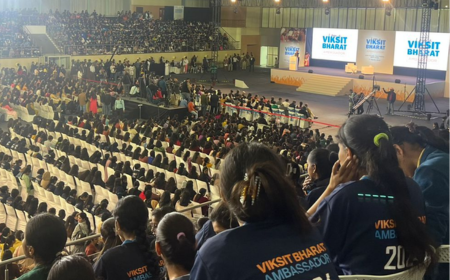
The Viksit Bharat Ambassadors’ ‘Nari Shakti Conclave’ held at the DU Indoor Stadium, North Campus, Delhi, witnessed a historic gathering of over 6,000 female students and faculty. The event’s response was so overwhelming that an additional 3,000 students joined, united under the shared goal of building a developed India by 2047. This conclave marked a significant milestone as the first-ever female-only event of such magnitude, organized a day before Women’s Day, observed globally on March 8th.
All student attendees proudly sported ‘Viksit Bharat Ambassador’ T-shirts and Wristbands in solidarity with the movement. Several thousand students had pre-registered through the NaMo App, totalling over 11,000 registrations, showing immense enthusiasm and support for the Viksit Bharat Ambassador movement.
The event’s main highlight was a thought-provoking conversation between Chief Guest and Union Minister Smt. Smriti Irani and Guest of Honor RJ Sharat. Their dialogue covered crucial topics such as the role of women in education and their leadership in spearheading the ‘Viksit Bharat’ journey. Four female student anchors, each representing different regions of India and adorned in traditional attire, hosted the conclave.
On Women’s Day, Prime Minister Narendra Modi also took to X to praise the #ViksitBharatAmbassador community, acknowledging their determination and commitment to nation-building. He emphasized that Nari Shakti’s active involvement would undoubtedly accelerate India’s journey towards becoming a developed and empowered nation.
During her address at the Viksit Bharat Ambassadors’ ‘Nari Shakti Conclave’, the Minister of Women and Child Development of India, Smriti Irani, urged students to join the Viksit Bharat 2047 mission and shared her mantra for women’s empowerment. Minister Smriti Irani highlighted the government’s focus on women empowerment, citing initiatives like building toilets in urban and rural areas since 2014 to ensure equal participation in Viksit Bharat.She noted the growing aspiration among youth to become Prime Minister, contrasting it with past beliefs about predetermined leadership based on family background.